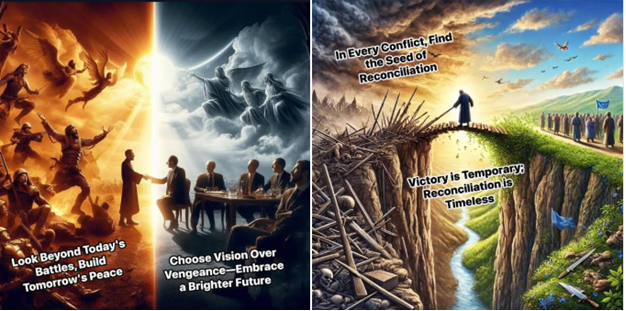
Kavi had long been a keen observer of human behavior, and one pattern particularly intrigued him: the stark contrast between the mindset of those obsessed with war and the perspective of those committed to reconciliation. In his observations, he noted a critical difference in how each group viewed victory and defeat.
The War Mentality
Kavi noticed that individuals with a war-obsessed mentality defined success in immediate, tangible terms:
- Immediate Victory: For them, capturing what is presently available was the ultimate triumph—a clear, measurable gain.
- Instant Defeat: Conversely, any loss, however small, was seen as a total failure, leaving no room for long-term vision.
- Short-Sightedness: Their focus was entirely on the present. Every battle was waged with the aim of seizing immediate advantage, with little regard for what the future might hold.
These individuals were like warriors entrenched in constant conflict, where every skirmish was measured solely by what was won or lost in that moment.
The Reconciliation Perspective
In contrast, Kavi observed a different approach in those dedicated to reconciliation and future-building:
- Future-Oriented Vision: They looked beyond the immediate outcomes, understanding that true progress is not confined to the present.
- Long-Term Gains: Instead of celebrating every small victory or lamenting every minor setback, they focused on building relationships and fostering understanding that would bear fruit over time.
- Foresightedness: Their insights told them that there exists much more than what presently appears before the eyes. Though not immediately visible, greater achievements could be attained through wise, deliberate actions.
These individuals were like architects of peace, laying the foundations for a future where reconciliation and growth would overcome the divisiveness of conflict.
The Political Exploitation of War Mentality
Kavi also turned his critical eye to the realm of politics, where he noticed a disturbing trend:
- Manipulative Tactics: Many politicians exploited the war mentality to win elections, using aggressive rhetoric and stirring up fears to capture immediate public support.
- Short-Term Popularity: These leaders focused on the immediate capture of power by promising swift, tangible victories, even if such actions compromised the long-term progress of the nation.
- Disregard for Future Well-Being: In their pursuit of electoral gain, these politicians manipulated citizens into believing that current gains, no matter how fleeting, were the true measure of success—ignoring the deeper, sustainable benefits of reconciliation and strategic planning.
Kavi warned that this manipulation not only deepened societal divisions but also hindered the nation’s ability to build a future of lasting peace and prosperity.
The Cycle of Conflict and Vision
Kavi saw that the war mentality and the reconciliation perspective were locked in a cycle:
- Immediate Confrontation: Those driven by war seek quick victories, only to face recurring conflicts when present gains prove transient.
- Short-Lived Triumphs: Their successes are temporary and often come at the cost of deeper, lasting discord.
- Future Possibilities Ignored: Meanwhile, those with a reconciliation mindset invest in building bridges and creating a future that transcends immediate battles.
- Transformative Foresight: Their willingness to look beyond current circumstances opens doors to opportunities and innovations that initially seem out of reach.
The Framework for a Future-Oriented Approach
Determined to guide his community toward a more sustainable path, Kavi proposed a framework for embracing foresight and reconciliation:
- Shift Focus to the Future:
- Vision Beyond the Present: Recognize that immediate outcomes do not define ultimate success. Cultivate a long-term perspective that sees potential where others see only current losses.
- Measure Success Differently:
- Beyond Victories and Defeats: Instead of tallying immediate gains and losses, assess progress by the strength of relationships built, ideas nurtured, and future opportunities created.
- Embrace Wise Action:
- Deliberate, Thoughtful Steps: Understand that what appears invisible today can be realized tomorrow through thoughtful planning and constructive dialogue.
- Invest in Reconciliation:
- Building Bridges: Prioritize efforts to mend and foster understanding, rather than engaging in endless cycles of conflict.
- Cultivate Foresighted Leadership:
- Leaders for Tomorrow: Encourage leadership that is not swayed by immediate victories but is guided by a vision of long-term harmony and achievement.
- Expose Manipulative Politics:
- Politicians Exploiting War Mentality: Challenge leaders who manipulate citizens through fear and immediate conflict. Remind the community that true national progress relies on policies that nurture long-term unity rather than short-lived triumphs.
The Lasting Impact
Kavi’s teachings resonated deeply within his community. As more people embraced a future-oriented mindset, the destructive cycle of immediate conflict began to wane. The community learned that true greatness lies not in the fleeting satisfaction of capturing present gains, but in the patient, wise actions that pave the way for reconciliation and a brighter future.
Kavi’s insights served as a powerful reminder: while the war-obsessed focus on the present may offer short-term wins, it is the foresighted, reconciliation-driven approach that unlocks the true potential of humanity—a legacy of lasting peace and profound achievement that endures beyond the transient victories of today.

